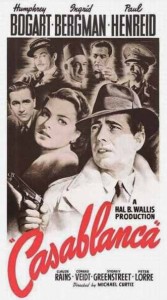This post has not been edited by the GamesBeat staff. Opinions by GamesBeat community writers do not necessarily reflect those of the staff.
Without much thought, art brings to mind paintings and sculptures, and over time it's grown to include music, and perhaps more begrudgingly books, while film continues to carve a niche in the world of "art".
Why have the last two come so late in the game? Film is a relatively new medium that continues to gain ground and dish out "classics" to be regarded in future centuries, but handwriting has been around just as long as any form of recording music.
Consider the ubiquity of more accepted forms of art. Anyone across the planet sees the Mona Lisa and generally agrees "Yes, this is art!" But more importantly, they may also exclaim "Sí, esto es arte!", "是的,這是藝術!", "Oui, c'est de l'art!" or even "جی ہاں، یہ فن ہے!".

Not sure what those mean? Roughly translated, they all recognize the Mona Lisa as art. Any person, any language, can glean something from the Mona Lisa. For that matter, Bach is also appreciated by more than just English speakers. Try that with "Casablanca".
So what's the significance of this on a blog about video games? One of the biggest hurdles facing the industry is legitimacy. While it spreads day by day, those of us not surrounded by other enthusiasts and industry analysts are well aware of the stigma that can come with the hobby and the glossed-over stares that a video game discussion tends to garner.
But bring up "The Dark Knight Rises" and the majority of the room can relate.
Does this mean "Arkham City" is less ubiquitous than it's film counterpart? Is the caped crusader less accessible to the masses in video game form than on the silver screen? While films translated for various languages overcomes these difficulties to most extents, I think there's something else to consider.
The English language consists of 26 letters and several pieces of punctuation that can be combined in seemingly infinite ways to mean seemingly infinite things. To the untrained Pakistani eye, Faulkner's use of those letters and punctuation means nothing.
Now consider Mario for your SNES. The controller had 12 buttons, the effects of which could be seen when activated. Death was met with a downtrodden ditty and dropping of the screen while victory meant riding a flagpole and trotting into the castle.
More importantly, anyone could figure this out. Without any help.
It might have taken a little while, but an afternoon was likely ample for anyone to get the gist, while learning a language without metaphorical training wheels will probably never happen.
-

- Art. More importantly, a new medium for an existing style of art
While we've gained a couple buttons and the nuances may be more intricate, games today reflect the same attributes. One might not follow the plot all that well, but anyone can pick up Okami, take less time to learn the controls than it might take, perhaps, to acquire a taste for freeform jazz, and recognize that the scenes being played out are magnificent and wondrous.
And do we ever really do much with art other than enjoy it? Some art sends a message, but scores of people hang Monet in their living room because "it's pretty", and we enjoy "pretty". By that logic, even Mortal Kombat fits the bill as a way to have a rip-roaring time ripping your friend's throat out.
Speaking of multiplayer – does anyone really enjoy art as a group? We can both look at it or listen to it, and should we share a dialect, have a conversation about it. It's not unlikely, however, that the patron next to you at The Louvre doesn't speak much of whatever it is you're speaking, so good luck having a meaningful conversation about just what it is that Mona Lisa is smiling about.
Regardless of what language you speak, however, two people can really bond over a game of Smash Bros.
We overcome gaps in generations, culture and language. That's what paintings, sculptures, music and yes, video games, share. Meanwhile, without help from a translator, films and books struggle more to accomplish this, but it's unlikely anyone will groan and proceed to hide your gift to them to cover up the nerdiness if you bought it at Barnes & Noble.
But even if video games acquire recognition as art, a theme you may have noticed here, does that justify dumping hours of time into them? Not all that much. Additionally, does it grant grossly inappropriate games like Saints Row: The Third a free pass? Despite how much we may enjoy it, not really. There will always be the Hobby Lobby wall furniture we hang simply because we enjoy it – not because it's moving the medium in any significant way or making contributions as "art" is wont to do.

No, my point is that we enthusiasts clamored out of our parents' basements long ago. Schools for game design cropped up, we started playing Angry Birds in front of people on the subway and if nothing else, some of us gamers even make a living doing what we do.
And beyond all that, just like the girl on the train reading Tolstoy today and Dickens next week, we're more than that. That girl probably enjoys partying or hiking just as much as I also enjoy rock climbing or cooking. It's not defining to be an enthusiast, but gaming beyond your smartphone still seems to imply that.
If we recognize games as art or even just a legitimate hobby, maybe we can start moving past that.
